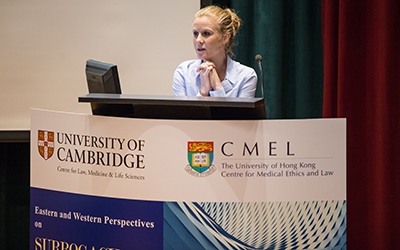 International surrogacy has been the subject of increasing scrutiny over the past 10 years, both by the media, as numerous scandals hit the headlines, and by politicians, where laws have struggled to keep up with advances in artificial reproductive techniques and rapid social changes. This conference, organised by Claire Fenton-Glynn, Jens M. Scherpe and Terry Kaan, on 9 and 10 September brought together in Hong Kong speakers from around the world to provide a more comprehensive understanding of the way in which surrogacy is approached in different jurisdictions, and ways in which countries can protect the rights and interests of all those involved in this process.
International surrogacy has been the subject of increasing scrutiny over the past 10 years, both by the media, as numerous scandals hit the headlines, and by politicians, where laws have struggled to keep up with advances in artificial reproductive techniques and rapid social changes. This conference, organised by Claire Fenton-Glynn, Jens M. Scherpe and Terry Kaan, on 9 and 10 September brought together in Hong Kong speakers from around the world to provide a more comprehensive understanding of the way in which surrogacy is approached in different jurisdictions, and ways in which countries can protect the rights and interests of all those involved in this process.
The focus of this conference was bringing together insights from “Western” jurisdictions – including Australia, New Zealand, England, France, Germany, USA, Russia, Israel and South Africa – whose discourse has dominated global discussions, with those from underexplored countries such as Singapore, South Korea, Taiwan, Thailand, Japan and Hong Kong. As such, the conference was able to explore not only different approaches to surrogacy regulation, but the religious, economic and cultural considerations that drive decision-making in this area.
In addition to academic speakers – coming from backgrounds in law, philosophy and medicine – the audience heard from three distinguished judges who have been instrumental in developing the law in their own jurisdictions. Sir Mark Hedley, a retired High Court Judge of England and Wales, shared his experiences of the difficulty of balancing parliamentary will, with achieving justice for the children involved in this practice. Dr Frank Klinkhammer, judge of the German Federal Court of Justice, explained the decision-making process involved in the landmark German case allowing registration of foreign surrogate births, even though the practice is prohibited within Germany. Finally, Chief Judge John Pascoe, of the Federal Circuit Court of Australia, emphasised the importance of placing children at the centre of decision-making, of parliament, the courts, and the prospective parents who might want to undertake a surrogacy arrangement.
The conference also heard from the Professor Nick Hopkins of the Law Commission of England and Wales, who spoke about the process of law reform, and the considerations that go into undertaking a project in this area.
Overall, the conference was a great success, providing a collaborative environment to start to think of new ways to confront this global challenge. The findings of this conference and comparative research project will be published by Intersentia Publishing in 2017.
For further information about the conference and the research project, see the conference website.
The following resources are also available to download:

 Facebook
Facebook  X/Twitter
X/Twitter  Instagram
Instagram  YouTube
YouTube  Flickr
Flickr  LinkedIn
LinkedIn